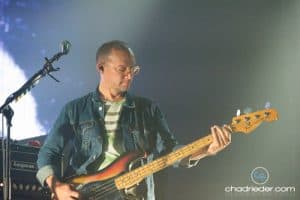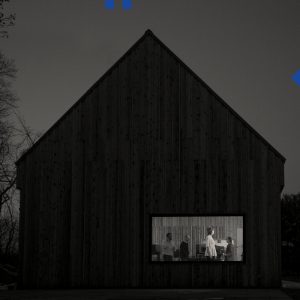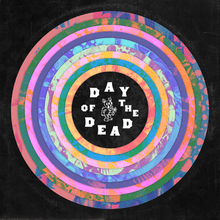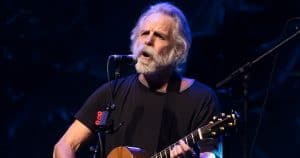The National: The 13th Floor Interview
Today marks the release of the much-anticipated new album by The National. Sleep Well, Beast is the band’s seventh long-player and the first to be recorded in their new studio in upstate New York.
The 13th Floor’s Marty Duda spoke to The National’s Scott Devendorf, who plays bass, guitars, synths and all manner of instruments with the band. The interview was conducted just after the band had finished a European tour and were gearing up for the release of Sleep Well, Beast.
Click here to listen to the interview with The National’s Scott Devendorf:
Or, read a transcription of the interview here:
MD: You guys just got off the road; is that right?
SD: Yeah. We were in Copenhagen, Denmark, for one week…. We were doing a festival called Haven that our band mate, Aaron, and his brother, Bryce, started this year – this is the first one – and we were playing at the festival, as well as doing a bunch of shows around it. It was fun.
MD: Was there a theme to the festival that Aaron and Bryce put together?
 SD: Yeah…. As it turned out, a few people that worked on our record with us were there. I guess the theme to the festival would be collaborative presentation of music: just like people jamming with other people, which happens a lot over there.
SD: Yeah…. As it turned out, a few people that worked on our record with us were there. I guess the theme to the festival would be collaborative presentation of music: just like people jamming with other people, which happens a lot over there.
MD: Did you guys end up doing anything different in your set than you would normally do in a show like that?
SD: Yeah. We had Justin Vernon from Bon Iver come out and do a couple of songs with us, and then Kwamie Liv came out and did a song with us…. Basically, we had people come out and play with it, which we had done before, but not in so much the same way we did this time.
MD: And you’re off the road for about a month, and then heading back out to Europe again; is that right?
SD: Correct, yeah. I think our first show is in Cork in September.
MD: what takes place in this month? Is it mostly gearing up for the release of this album, and doing promo?
SD: Yeah, I think there’s some gearing up. We’re going to do some press promo stuff between now and mid-September. I think, during the course of the week leading up to release, we’ll probably do a bunch of things… but we’ve got at least a week off.
MD: With the whole business of the album release and the tour looming in the very close distance: is it something you look forward to, or is it daunting? How do you feel about the whole process?
SD: We look forward to it. We do spend a lot of time away from it too. It’s always a little fresher when the record’s coming out; it’s very exciting. In a year from now… it’ll be tiring. It’s exhausting to a certain level, but it’s certainly super fun. All the shows are always really fun, it’s just more the in-between touring that gets a little exhausting.
 MD: Hopefully, we can talk a bit about the new album, Sleep Well, Beast. It’s been four years since the previous record, but you guys have done a lot, individually, in different collective groups since then. How would you describe that four year space? Was it too long between albums for you, or was it just about right? How do you feel about it?
MD: Hopefully, we can talk a bit about the new album, Sleep Well, Beast. It’s been four years since the previous record, but you guys have done a lot, individually, in different collective groups since then. How would you describe that four year space? Was it too long between albums for you, or was it just about right? How do you feel about it?
SD: It felt just about right, because… I think the things we were doing in-between were all…one that we were all mostly involved in, in one way or the other…. we did… the Day of The Dead, which was one of the things that we all  worked on for a period of time, and then Bryan and Ben Lanz and I did LNZNDRF, but that was like another part of the continuum, I guess, because we all play together in The National so, we were comfortable around each other. So yeah, it felt like the perfect amount of time, in some ways, because we were able to do these fun things…. We also worked on Bob Weir’s new record – we’re big fans – so, the time passed pretty quick.
worked on for a period of time, and then Bryan and Ben Lanz and I did LNZNDRF, but that was like another part of the continuum, I guess, because we all play together in The National so, we were comfortable around each other. So yeah, it felt like the perfect amount of time, in some ways, because we were able to do these fun things…. We also worked on Bob Weir’s new record – we’re big fans – so, the time passed pretty quick.
MD: What was it like working with Bob Weir?
 SD: He’s amazing! We were fans for a long time…. We did a one off show with him in 2012… that was really stressful and fun and exciting – and it went really well, I thought – and he liked working with us, and our friend Josh Crofton who was the band leader for that event – got to work with him, songwriting and producing Bob’s record, and then he asked some of us, who worked on the session, to play with him. He’s very sagely… in the way he works. He’s also not stressed about time… “Oh yeah! That session was four hours long;” there’s no hurry to the day. He’s a really hard worker too; so, rehearsals and writing can be ten hours long, but it goes by in flash. He’s great!
SD: He’s amazing! We were fans for a long time…. We did a one off show with him in 2012… that was really stressful and fun and exciting – and it went really well, I thought – and he liked working with us, and our friend Josh Crofton who was the band leader for that event – got to work with him, songwriting and producing Bob’s record, and then he asked some of us, who worked on the session, to play with him. He’s very sagely… in the way he works. He’s also not stressed about time… “Oh yeah! That session was four hours long;” there’s no hurry to the day. He’s a really hard worker too; so, rehearsals and writing can be ten hours long, but it goes by in flash. He’s great!
MD: Did any of the experience of working on the Dead stuff, in general, seep into what The National are doing now…?
SD: I think so, as far as the open ended song writing process, and not being so worried about having a bunch of verses and then a weird change and then a chorus of sorts; just a strange structure that the Dead knocked out of American music. I don’t think we’ve made a Dead record. I think the spirit of that open ended, not needing to start and end on a dime, and being more open to improvisation, I guess, in the studio….
MD: I would definitely not call Sleep Well, Beast a Dead record by any stretch of the imagination. I’ve had a chance to hear the whole thing, and it’s definitely its own beast. How would you describe it to people, who haven’t heard it yet, as an overall thing? Is there an overall vibe or feel to it?
SD: Yeah, I think there is. What it is, exactly, probably varies a little bit when and how you listen to it. It’s a record that goes a lot of places, it starts quietly in a weird fugue state, and then in-between, there’s some rock songs. A lot of the songs are some of the most personal songs that Matt has written in a while, as far as direct references, but there’s also all this magically indirect stuff, that I like about his writing, in it too…. Magically indirect.
MD: I know the album was recorded in this new studio that you guys have put together in the Hudson Valley; is that right?
SD: Yeah.
MD: How much of the location and the studio affects what we hear on the record now?
SD: I think a lot of it. It was a completely new building that we thought about…. It’s a big open space that we were recording and mixing in; so, we built it and designed it to that idea at least. It paid off, it worked well for us, and everything sounded great, and we were able to do what we needed to do as a band… basically, the whole process happened there for the last six months. We took everything we had recorded in previous sessions, and we were able to apply it there too. John Lowe, who engineered it, was a great help in building the space to our ideas, and then also recording everything so impeccably; so, thank you John Lowe!
MD: For you as a bass player: what is important to you in the studio environment? Is it a matter of where you are or what you can hear? What do you look for?
SD: Honestly, when we were working in the studio, we weren’t actually playing that much bass – both Aaron and I play bass on the record. We did sessions where we did bass tracking, and then we just improvised a bit, and then we would switch off and play different instrument: guitars and synths and stuff. It was great for all those things: Bryce, for example, was able to plug in, and be in his own separate world, and be listening and recording some stuff that we were doing, but also try totally ‘off the wall’ stuff – looping and whatever – that only he could hear, and then he would submit it to the forum to discuss, i.e. put it through the speakers, and we’re like, “Oh yeah, that’s really crazy and cool!” I think that was the best part of it for everyone, not any individual, sonic aspect; all that worked out pretty well to the drum sounds, which my brother was happy with, for the first time ever; so, the drum thing worked out. The acoustics of the place are great. We… worked a lot in this studio called Dream Land, that’s up there in West Hurley, New York, that’s a commercial studio, where we recorded a lot of the Day of The Dead stuff. It’s an old wooden church; so, obviously, it has even more amazing sonic vibes than a brand new studio does; but I think the size and shape, and the way that sound reverberated in that space, inspired us on the design of this place.
MD: … I noticed, on some of the songs, there didn’t seem to be a lot of bass going on there. What other things did you get up to on the record, and how did you incorporate yourself into the tracks?
SD: There’s a lot of super melodic bass parts that play along with the piano. They intertwine; so, like on Guilty Party, the piano and the bass are doing very similar things, or are paired together to make a little harmony in some places…. The other stuff we did was a lot of synth playing; so, I was playing these little pocket pianos from a company called Critter & Guitari, that makes little analogue synth sequencer things. I think the end of Walk It Back has a lot of me and Bryce playing synth parts together, and jamming on that, and Nobody Else Will Be There, the first song on the record, has these synthy, weird, dreamy kind of things run through a bunch of effects and tripped out a bit. Playing bass in the studio, at least with our band, is one of the last thing that happens in some ways, because all the structure has to work out, and you have to figure out these parts that work in the context of what’s happening: there are simple parts that propel the song and hold the chords… or there is more melodic stuff that happens; and I think there was more of that on this record, even some funky bass happens – not slapping, per se, but ‘octaving’ down a scale… disco style – like on Day I Die and… a little bit of System has some guitar soloing that required a little bit of uppity bass playing. But yeah, it was fun!
MD: One of the tracks that really caught my attention was Turtleneck. It was like a full on psych rocker, and I was like, “Whoa! Where did that come from?”
SD: Yeah, that was fun for me…. We played the song live a bit, and then Matt changed the lyrics a few times… so, it was definitely a rock song that was… a little bit psych rock, a little bit… existential crisis. It was fun!
MD: I assume Matt presents the songs to you guys, in some form or fashion, and then you have a discussion about them. What is that process like for this record?
SD: We present the music to him, and then he presents what he has figured out as things we can work with, basically. That process is interesting, because often people… have things they like… and want him to pick ‘this’ and not ’that’, and blah, blah, blah; and so, whatever he gravitates towards, is where we end up, as far as, at least, a start. Our process is a little more open: we usually work on twenty or thirty songs per record, and then twelve or thirteen make it…. It’s kind of a lengthy process; it’s never totally clear. I think, also… we seem to, more often, have songs that are like, “Oh, that’s two songs. Let’s make it into one song, or at least let’s try,” and then that’s either the best thing ever or the worst thing ever, as far as what it’s going to mean for the band and mean for the process of making the song work. That happened a couple of times on this record, where there were two songs where we’re like, “I like ‘this’, and I like ‘that’, but can they be the same thing?” And it’s like, “No! You can’t have the same beat and ‘that’….” In the end, everyone has to agree; and for that to happen, everyone has to work together through it.
MD: Has that process remained the same over the years? Does the band work together similarly now, than you guys did ten years ago?
SD: I would say it’s more now than ten years ago. Well, I don’t know; I feel like, in some ways, we’re back to working the way we worked on Alligator, we’re all like, “Let’s go to the studio in Brooklyn, and try and figure out how to make songs.” We did that for a bit, and then we tried different things on each record; and I think we’ve tried everything that we’ve tried in the past but once. This time we’re like, “Let’s record together, but let’s send each other ideas…” the basic ‘sit down together’ things happen more on this one. It was a combination of all our best efforts of the past.
MD: You’ve only been – I assume – playing a few of them live at this point. Do you expect them to change and reshape themselves once you get them on stage with you?
SD: Yeah, I hope so. We always hope so…. At this point now, we have played all the songs live: we did two shows where we intentionally played the whole record, and I think it went well. My expectations of some of the stuff… it worked better than I thought it would, and then other things, there were just interesting aspects that popped out. We got to play them with the help of some of the people that recorded with us and so doing that live…we had worked with them and recorded with them, but we’d never all played together. Seeing that happen live, was intimidating, exciting and harrowing, but super fun; and I think the more that we can do that live – we intend to bring some of these guys with us on tour, and hopefully, they’ll support us – that would be the best; to be able to keep doing that; because, I think, the more you do that – the more you play with different people – the more you’re just going to generate unique shows.